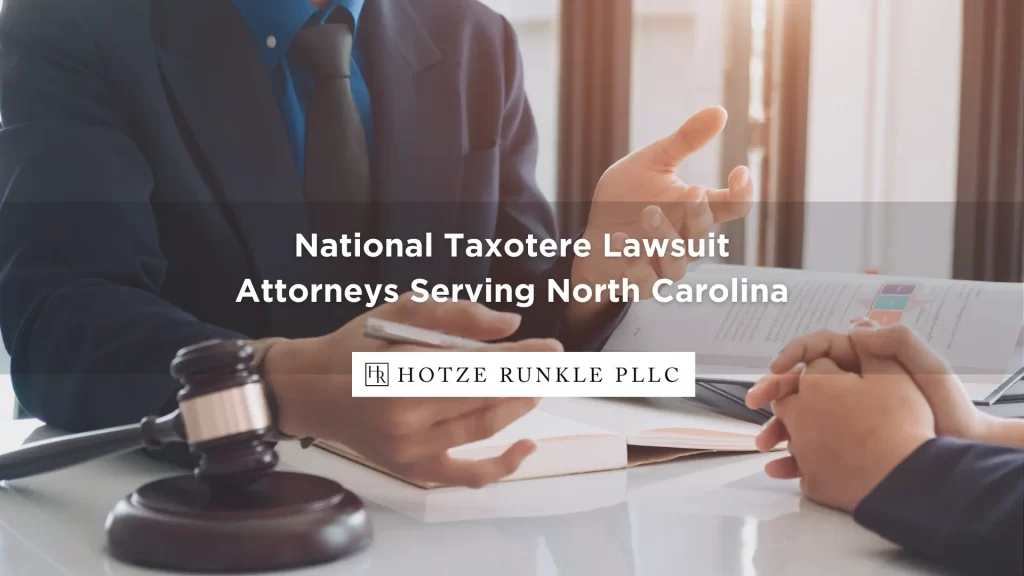
Taxotere is a chemotherapy drug most commonly used to treat breast cancer. Lawsuits have been filed against the pharmaceutical company, Sanofi-Aventis after patients have reported side effects from the medication. Many individuals came forward complaining of irritating symptoms, such as blurred vision, watery eyes, and swollen eyelids. Those symptoms are the result of canalicular stenosis. If you’ve developed this condition due to Taxotere, you could be owed significant compensation from the manufacturer.
If you developed Canalicular Stenosis symptoms after taking Taxotere, call Hotze Runkle PLLC to speak with a North Carolina canalicular stenosis Taxotere lawyer. The adverse reactions caused by a drug designed to cure cancer are appalling. No one should beat cancer only to discover they’re facing a new set of challenges. Whether you treated with Taxotere once a week, every two weeks, or every three weeks, you might qualify for financial compensation.
What is Epiphora and Canalicular Stenosis?
Epiphora causes excessive tearing. Cancer patients noted that the symptom developed during their Taxotere chemo treatment. When functioning correctly, tears pass from the tear ducts to the nasal cavity through eye structures called canaliculi. If chronic inflammation occurs, it could lead to an infection. A Canaliculi infection left untreated causes a blockage or obstruction that doesn’t allow tears to funnel through as intended.
Without proper diagnosis and management of your watery eyes, the canaliculi close, preventing tears from traveling to your nasal cavity. Canalicular Stenosis is a severe medical condition that isn’t reversible. You could manage your symptoms, but only with an expensive and invasive procedure. Cancer survivors experience many symptoms from Canalicular Stenosis, such as:
- Excessive, watery eyes
- Swollen eyelids
- Blurry vision
- Light sensitivity
- Eye lens clouding
- Infections of the eye
- Dry eyes
- Cystoid macular edema
- Headaches
The symptoms suffered by patients undergoing Taxotere treatment range from mild to severe. Many consider it a slight inconvenience, while others say it’s completely disruptive to their life. It interferes with routine tasks, such as applying makeup and driving a car. Quality of life diminishes, and some find it overwhelming to handle.
How is Canalicular Stenosis Caused by Taking Taxotere?
Sanofi-Aventis designed and manufactured the drug Taxotere to prevent cancer cells from growing and spreading to other parts of the body. An oncologist administers the drug on a specific schedule, depending on how advanced the disease is. Although successful in treating various forms of cancer, including the stomach, lungs, and prostate, it’s most commonly used to treat breast cancer.
Studies performed on breast cancer survivors found the correlation between Taxotere and the symptoms of Canalicular Stenosis. Secretions from the drug came in direct contact with their tears as they traveled to the nasal cavity from the tear ducts. The direct contact led to chronic inflammation and infection, resulting in Canalicular Stenosis symptoms.
How Do I Treat My Epiphora or Canalicular Stenosis?
If caught early, you could manage epiphora symptoms. As soon as you experience excessively watery eyes, you should undergo an evaluation by an ophthalmologist. If they determine epiphora is causing your symptoms, they will monitor your health regularly to ensure a more serious problem doesn’t develop.
If you wait too long to seek treatment, what started as one little symptom could turn into a range of severe symptoms. Canalicular stenosis is a permanent medical condition. There’s no cure for serious cases, but you could manage your symptoms with the successful completion of DCR. DCR, dacryocystorhinostomy, is an invasive procedure performed by an ophthalmologist. A stent is placed for tears to funnel through and navigate their way to the nasal cavity, bypassing the obstructed tear duct altogether. Despite its promising results, you could suffer from symptoms as aggravating, if not worse, than your canalicular stenosis. The risks you expose yourself to when undergoing DCR includes:
- Bleeding excessively
- Severe facial scars
- Partial or complete blindness
- Infections of the eye
- Displaced stent
- Ineffective procedure
- Abnormally fused tissue in the nose
You must treat your symptoms the second you start experiencing them. Allowing your condition to progress will only cause more problems down the road. The best way to prevent an advanced diagnosis is to manage your symptoms early.
Can I Sue Sanofi-Aventis for my Epiphora or Canalicular Stenosis Symptoms?
Sanofi-Aventis has manufactured and marketed the chemo drug since 1998. However, despite these efforts, they didn’t release warnings about the dangerous side effects until 2014. A former employee of the drug manufacturer also accused them of paying physicians to prescribe Taxotere for treatments the FDA never approved. Allegations that the pharmaceutical company knew about their chemo drug’s potential to cause adverse reactions led to hundreds of lawsuits.
When you’re considering filing a lawsuit against a multi-million dollar corporation, it could feel overwhelming. The fact of the matter is companies hold a responsibility to ensure their products are safe and don’t harm their consumers. Sanofi’s complete disregard for breast cancer patients taking their drug is negligent and unethical. They supposedly knew about the negative side effects but hid them from the FDA and its distributors.
If Taxotere led to any symptoms not disclosed at the start of your treatment, you’re entitled to file a lawsuit. The side effects of a drug meant to cure breast cancer are debilitating. If you’re suffering, unable to work, and worried about your expensive medical bills, your North Carolina Taxotere lawsuit lawyer can help you seek justice. You have the right to stand up to drug manufacturers like Sanofi-Aventis and demand fair compensation for the harm their drug caused you.
I Can’t Afford A Lawyer. What Should I Do?
Trying to stand up to a powerful drugmaker alone is a daunting proposition. It’s also not something you should ever have to worry about. At Hotze Runkle PLLC, our legal team represents clients on a contingency-fee-basis, which means that you won’t pay us anything until we win money for you. Our case evaluation is 100% free of charge, and we will not collect any payment for representation until your case is resolved and a recovery has been secured.
It’s crucial to hire a professional to handle your case. Trial lawyers understand the evidence needed to prove an individual’s injuries happened as a result of someone else’s reckless decisions. There are strict deadlines you must adhere to and documentation you must submit to the courts. Anyone unfamiliar with the legal process might not know the essential laws and statutes involved in their case.
In the state of North Carolina, the product liability statute of limitations is three years. That means you must file your lawsuit no later than three years from the date your injury occurred. If you miss the three-year deadline, you lose your right to sue.
Hiring a North Carolina Taxotere lawsuit lawyer is your best chance at receiving the maximum compensation available. Unrepresented victims get taken advantage of in product liability lawsuits. The defense attorneys could use their experience and power to intimidate or pressure you into settling the case for less than you deserve. If you don’t understand what your rights are, you might accept any lowball offer they present to you. With a dedicated trial lawyer by your side, you can feel confident knowing you’ll receive fair treatment, no matter what.
How Much Compensation Could I Receive in My Case?
 The North Carolina Taxotere lawsuit lawyers from Hotze Runkle PLLC will review the details of your case to determine how much your financial award should be. According to North Carolina product liability laws, you qualify for compensation for any damages you incurred while treating your injury.
The North Carolina Taxotere lawsuit lawyers from Hotze Runkle PLLC will review the details of your case to determine how much your financial award should be. According to North Carolina product liability laws, you qualify for compensation for any damages you incurred while treating your injury.
When it comes to product liability lawsuits, there are two types of damages: economic and noneconomic. Economic damages are actual expenses, such as medical bills, while noneconomic damages are compensation for pain and suffering.
The damages you could potentially seek compensation for include the following:
- Medical Expenses: Medically necessary treatment for your injuries, such as ER and urgent care visits, specialist care, prescriptions, and surgery.
- Lost Wages: Any pay you couldn’t earn because your injury prevented you from returning to work for some time.
- Pain and Suffering: Significant physical pain that affected your ability to enjoy life or perform routine tasks.
- Emotional Distress: Emotional trauma you endured from the incident, such as shock, stress, and depression.
You’re usually compensated based on the severity of your injuries and the time it took to recover. If your doctor performed a thorough evaluation and determined your injury is permanent, you could seek financial payment for any future expenses related to your treatment.
Fill Out Our Quiz To Find Out If You Qualify for Compensation
If you took Taxotere and experienced symptoms of epiphora or canalicular stenosis, you could be owed significant compensation. To find out if you qualify, take our simple quiz here.
If you are eligible to take legal action against Sanofi-Aventis, our North Carolina Taxotere lawsuit lawyers will use our experience, knowledge, and resources to get you the maximum compensation possible for your claim. We will do everything in our power to get you the justice that you deserve.